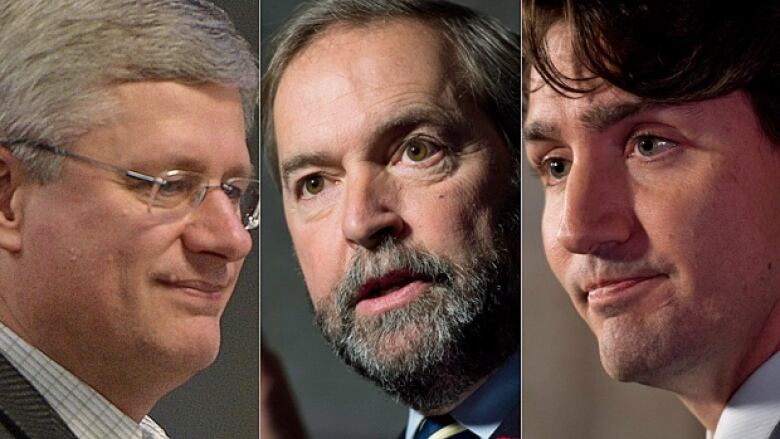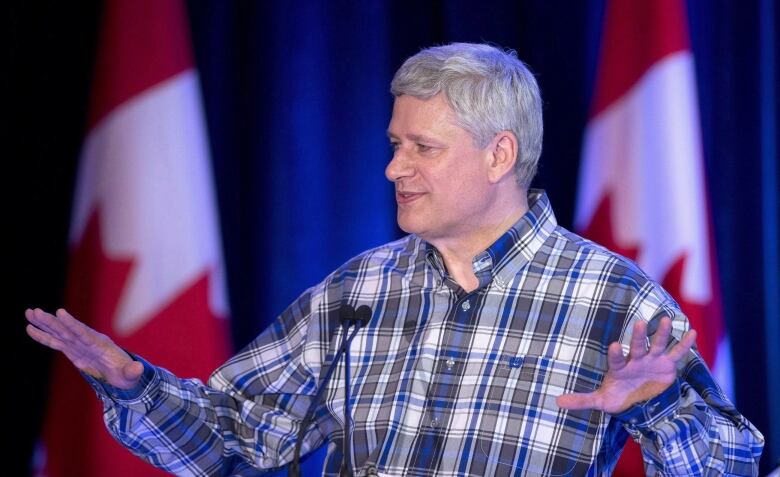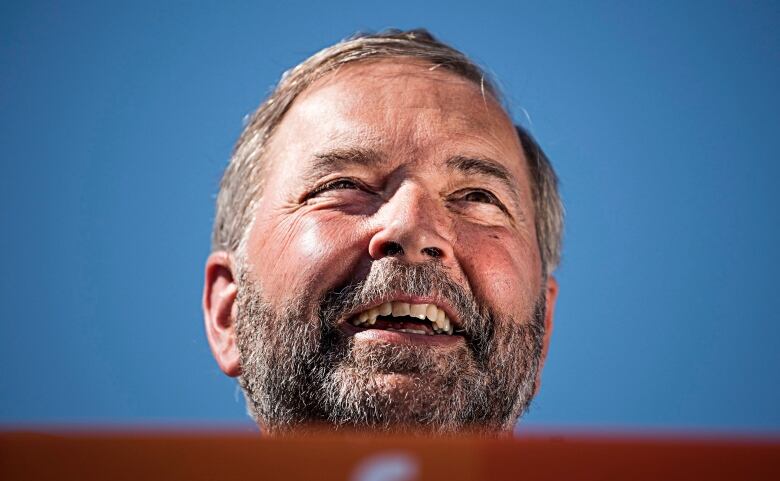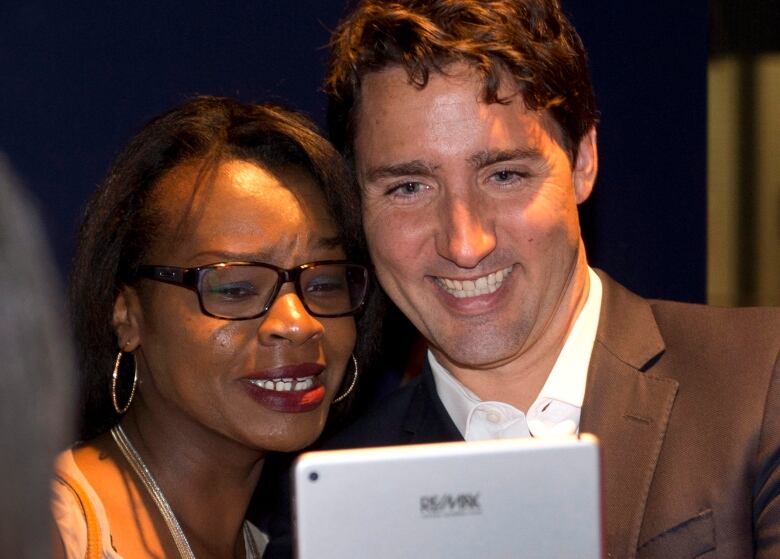Mulcair, Trudeau approval ratings point to potential for growth
NDP and Liberal leaders ahead of their party's numbers, but only Mulcair's trends are positive

The NDP's election victory in Alberta may be the catalyst that propelled the federal New Democrats into first place in the polls, but leader Tom Mulcairhas seen his own personal approval ratings improve as well.
With approval ratings falling for rival leaders Stephen Harper and Justin Trudeau, the NDP leader is in a strong position with less than three months to go before the election.
- Interactive: Follow the trends with CBC's Poll Tracker
- Analysis: Liberals falling further behind NDP-Conservative race, polls suggest
- Analysis: NDP holding on to lead with 3 pillars of B.C., Ontario and Quebec
The polls also point to potential growth areas for the NDP. Mulcair, leader of the Official Opposition since 2012, still remains the least known of the three federal leaders albeit with the best chance to become prime minister in October.
Mulcairhas averaged approval ratings of 51 per cent in polls conducted since mid-June, an increase of 10 points from his ratings a year ago. His disapproval rating, at 25 per cent, has dropped slightly over the last year, as have the number of Canadians who say they are unsure of the NDP leader. But at 24 per cent, that still represents a large portion of the voting public.
These numbers give Mulcair a net rating of +26, far superior to those of both Harper and Trudeau. Harper's approval rating has averaged just 31 per cent, with 60 per cent saying they disapprove of the Conservative leader. Trudeau's approval rating of 41 per cent is better, but his disapproval rating has increased to 42 per cent. Where he had a net rating of +9 last summer, that rating is now -1.
Harper: Unpopular in the wrong places
Of particular concern to Harper and the Conservatives should be the prime minister's poor personal ratings in British Columbia and Ontario, two provinces that were key tothe Tories' 2011 majority victory.

In B.C., Harper's approval rating stands at just 23 per cent, with his disapproval rating a potentially crippling 69 per cent. Only in Atlantic Canada, where Harper's approval rating has averaged 20 per cent since mid-June, are his numbers lower. This suggests the Conservatives' prospects for growth in this battleground province are poor.
Harper's numbers are better in Ontario, where his approval rating is 34 per cent and his disapproval rating stands at 58 per cent. Nevertheless, his approval number is still significantly below the 44 per cent share of the vote the Conservatives captured in Ontario in 2011.
Only in Alberta does Harper havea net positive rating, and even there itis only +2. Lacklustre numbers in the Prairies, Quebec and among women where the prime minister is a net -34, compared to a net -23 among men suggest Harper may not be a draw for his party.
Were the Conservatives to match Harper's approval ratings in each region of the country on election night, they would almost certainly be defeated.
Mulcair: More room for NDP growth
Mulcairis in the opposite position to his Conservative opponent. In every part of the country, Mulcair's approval ratings are higher, and in some places significantly so, than support for the NDP. Half of voters in Atlantic Canada and a majority in British Columbia (55 per cent) and Quebec (60 per cent) approve of the NDP leader, yet his party's support in each of these regions is below 40 per cent. This suggests that the NDP has plenty of room to grow.

This is especially the case consideringMulcair's disapproval ratings are quite low. They are above 30 per cent only in Alberta and the Prairies, where the NDP's prospects were always going to be modest. In B.C., Mulcair's disapproval rating is just 22 per cent, and in Ontario it is just 26 per cent. That gives him a net +23 rating in Ontario, far better than either of his main opponents at a time whenthe NDP remains locked in a three-way race in the province.
Interestingly, Mulcair does equally well among men and women, with a net rating of +26 among both genders. While Harper does better among men, Trudeau does better among women, with a net +2 rating compared to a -6 rating among men. But almost one-third of women say they do not have an opinion of the NDP leader.
Mulcair is best known in Quebec, but even there 20 per cent of voters have no opinion of him. That rises to 26 per cent in Ontario and 27 per cent in Atlantic Canada.
Mulcair still has some work to do to become better known, but that can be a double-edged sword.While dropping "don't know" rates have coincided with improving approval ratings for Mulcair, it is not a given that this will continue in the spotlight of an election campaign.
Trudeau: Worsening, but room for growth, too
Even before he became Liberal leader, Trudeau was better known to the public than the NDP leader. While his notoriety certainly helped the Liberals, opinions on Trudeau have always been strong. And recently, they seem to be souring.

His approval ratings have been dropping and his disapproval ratings increasing, making Trudeauthe most polarizing of the three leaders. His net rating is just +3 in British Columbia, +1 in Quebec, -1 in the Prairies, and -2 in Ontario. This means that roughly equal proportions of Canadians in these regions approve or disapprove of the Liberal leader.
Only in Alberta, where Trudeau's approval rating is just 29 per cent, and Atlantic Canada, where it has averaged 50 per cent, do voters have a consensus opinion on him. This gives Trudeau less margin of error.
Nevertheless, in every region of the country Trudeau remains significantly more popular than his party. This makes him more like Mulcair than Harper in this regard, and suggests that he still can boost his party's standings. If the Liberal Party matched Trudeau's approval ratings at the ballot box, they'd likely win a majority government much like Mulcair and the NDP.
But only one of the three leaders' numbers are trending in a positive direction.
This article analyzespolls published from mid-June to today. These polls differ in methodology, field dates, and sample sizes. The CBC has not individually verified these polls.












_(720p).jpg)


 OFFICIAL HD MUSIC VIDEO.jpg)
.jpg)



























































































